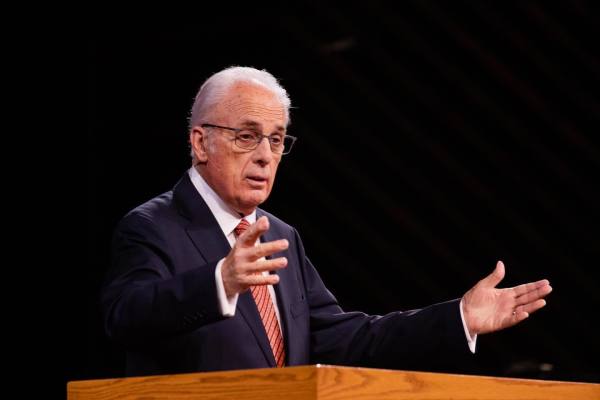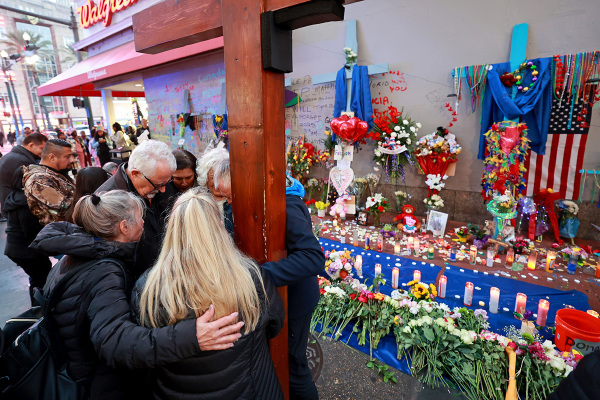C12 CEO on how to avoid a bad theology of business

Does a missionary do holier work than an engineer? Is God begging for our charitable donations? What message does your church give young adults who are just beginning their careers?
I discussed these questions and more with Mike Sharrow on the podcast Business in the Kingdom on the Edifi network. Mike is the CEO and President of C12, one of the largest networks of Christian business leaders, all working towards growing their businesses and bringing their faith into their work.
Here are some excerpts from our conversation, lightly edited for length and clarity:
What does C12 do?
Mike: "We serve business owners, CEOs, presidents - people who run a business. We focus on growth-stage businesses, we don't really do startups. It's usually people with at least a couple million dollars in revenue and at least 10 or more employees. I think our largest member is maybe a $6.5 billion revenue company, but most are going to be in that $10 million-$200 million range of revenue. 50-100 employees is pretty typical.
"We're asking them the question, 'What does it mean to say that we honor God in our business? What does it mean to do business as a ministry and realize that we're all ministers of the gospel, and that our greatest gift is not just financial giving?' I love philanthropic giving, we should do more of it, but it's actually the easiest part. I don't think God is a 501c3 begging for our charitable donations. I think He's going to say, 'What have you done in my name, and have you stewarded your business as a chance to shape communities and people and lives and industry?' So we say we exist to help Christian CEOs and owners build great businesses but do it for a greater purpose, and to see the gospel change the marketplace."
How are we maintaining the bad theology of the 'Sacred Secular Divide'?
Mike: "I found C12 as a customer originally, and I found it really as a byproduct of a journey of realizing too often, we let our vocation define our identity rather than let our identity define our vocation. There are hundreds of thousands of leaders like me who have what I call the 'Sacred Secular Divide': They don't know how to live one life in Christ in business, and they don't know what it means to actually honor God and live out their faith Monday through Friday as much as they do Sunday. There's a tremendous marketplace out there of men and women who are followers of Jesus Christ and running businesses, and those seem like two different plates they're spinning instead of one idea. When you can bring those things practically together, it changes worlds, lives, and business."
Jerry: "This 'Sacred Secular Divide' thing keeps coming up over and over again when I talk to Christian business leaders. I recently talked to our mutual friend Greg Leith from Convene, and right out of the gate he started talking about that. He was an Elder at church and they would lay their hands on missionaries to go out into the world, and he thought, 'I wish I could do something that would merit the laying on of hands.' Later, he realized that was bad theology. He came to understand that, as an entrepreneur and a business leader, he was already doing something that merited the laying on of the hands of Elders as a commission ministry."
Mike: "I think we start planting that duality, that laity/clergy divide, in childhood. I was asked to do a keynote talk at a high school graduation for a Christian youth group of about 100 students. At the start I said, 'How many of you have acknowledged a call that for the rest of your life you're going to be committed to full time ministry?' Three raised their hands and we applauded them; one is going to a mission in Africa, one is going to be a worship leader, one is going to be a youth minister. We celebrated them. Then I looked at the other 97+ kids and said, 'Why did you not raise your hand?' one said, 'I'm just going to be an engineer,' and one said 'I'm just going to be a teacher,' and another said, 'I'm just going to be a nurse.'
"I replied, 'I'm sorry, how many of you are followers of Jesus Christ?' All their hands go up. And I go, 'But 97% of you somehow think that because you're not going to Africa, you're not called to ministry for the rest of your life?'"
Jerry: "Bad theology."
Mike: "Yeah! And it starts at that point. We celebrate Johnny and Susie for going to do full-time ministry, and the rest are just kind of, 'Don't screw up and fund those who do,' and we launch them off on this dualism from a young age without even realizing the harm of it."
Jerry: "So that's the idea that the Christian entrepreneur or business executive is essentially..."
Mike: "A bank."
Jerry: "An ATM, right? That's what they're there for."
Mike: "Don't do bad things, like try to be a decent billboard for Jesus, right? Get people to your church, and fund those who are doing the work of ministry. And maybe in the evenings and weekends you can supplement that with some ministry yourself."
God is a worker
Mike: "It took me years to go back and almost reread my theology. In Genesis, we're created in the image of God, in imago dei. In the garden before sin, we had fellowship with God and with one another and we would work. All those things were pre-sin, pre-fall. It all got ruined by the fall. Work was not a necessary evil, it just got toilsome. In Genesis we see a God who spent the first 6 days building stuff, making stuff. Work and creation and productivity is actually part of us resembling the very nature of God. I grew up in the church as a child and it's so easy to forgot that these Bible characters like Abraham, Isaac, Jacob, and even Joseph and Nehemiah were professionals in businesses."
Jerry: "They weren't ministers. Eztra was a priest, but most of the great characters weren't priests."
Mike: "They had day jobs!"
Jerry: "Right!"
Mike: "And some were working for pretty pagan cultures, right? But we forget that. We think that they were somehow super-spiritual priests. God's been using people in their vocation for millennia, right? So it's not a novel thing, not a new thing, it's not a C12 thing, but it's a forgotten thing."
Jerry: "And when did God rescind his order, the cultural mandate, to fill the earth and subdue it? Guard, serve, work - you can translate it in different ways but it's clearly physical labor in one form or another. I see no point in the scriptures when God said, 'Oh, I know that earlier on I said what it is to be human, but now you just do religious stuff.' Work is already a religious thing."
Mike: "Correct."
Jerry: "He never rescinds it. Sometimes people discuss the Great Commission (Matthew 28:16-20) as if it replaces the cultural mandate (Genesis 1:28) but I think biblically the Great Commission allows us to preach the gospel to the nations to free them up to return to their human calling, the Cultural Mandate, without the idolatry."
Mike: "Agreed, and I think the whole 'As you go' part of the Great Commission speaks to being in the midst of all those places. When I first began to recognize my dualism and bring those worlds together, I was working at a big corporation in Chicago. I began to realize how much more powerful it was for me to try to work out what it meant to be a follower of Jesus surrounded by hundreds of thousands of people who didn't go to church and begin to have organic conversations with them about that. They weren't going to local churches asking those questions. They would ask me those questions all day long, seeing me as a fellow professional trying to work out my salvation at work. I think the Great Commission and great commandments actually, get lived out really beautifully in the context of our daily work."
Jerry: "Yeah. 'As you walk by the way, as you sit at home,' ..."
Mike: "Deuteronomy 6:7, exactly."
Jerry: "This is as you're going about your day. This isn't Sabbath worship because they wouldn't be doing all that walking! This is during the work day, with the kids, they're teaching everything that God commanded."
Click here to listen to the complete first half of our conversation on Business in the Kingdom on the Edifi network.
Jerry Bowyer is financial economist, president of Bowyer Research, and author of “The Maker Versus the Takers: What Jesus Really Said About Social Justice and Economics.”






















